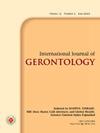Artificial Intelligence of Neuropsychological Tests for the Prediction and Verification of Decline in Gait Parameters in Patients with Mild Cognitive Impairment
IF 0.3
4区 医学
Q4 GERIATRICS & GERONTOLOGY
引用次数: 2
Abstract
Background: Mild cognitive impairment (MCI) is considered a transitional state between normal aging and very early dementia. Increasing evidence reveals gait and cognition are inter-related in older adults with MCI. Therefore, it is important to find reliable biomarkers for these MCI patients, which can be utilized as an indicator for early detection and intervention. Methods: The deterioration of cognitive function will affect the patient's walking ability; thus, we conduct a two-stage study with comprehensive neuropsychological testing and a portable device for gait analysis at the beginning and repeated gait analysis six months later to evaluate gait deterioration. By machine learning using neuropsychological testing scores as the input feature parameters, a classification model capable of predicting the gait performance of MCI patients can be obtained. Results: Machine learning is capable of predicting several gait features of the MCI patients, such as reduction in walking speed (with up to 81.82% accuracy), increase in the time of the timed up and go (TUG) test (with up to 66.67% accuracy), and reduction in vertical jump height (with up to 69.23% accuracy) based on the predictive neuropsychological testing scores. Conclusion: Overall, the neuropsychological testing is predictive of gait decline, especially of walking speed, followed by vertical jump height in MCI patients. Therefore, the highest correlation among gait parameters in MCI patients could be the walking speed.人工智能神经心理测试对轻度认知障碍患者步态参数下降的预测和验证
背景:轻度认知障碍(MCI)被认为是正常衰老和早期痴呆之间的过渡状态。越来越多的证据表明,老年轻度认知障碍患者的步态和认知是相互关联的。因此,为这些MCI患者寻找可靠的生物标志物,作为早期发现和干预的指标是非常重要的。方法:认知功能恶化会影响患者的行走能力;因此,我们进行了一项两阶段的研究,在开始时进行全面的神经心理测试和便携式步态分析设备,并在六个月后进行重复的步态分析以评估步态恶化。通过机器学习,以神经心理测试分数作为输入特征参数,可以得到一个能够预测MCI患者步态表现的分类模型。结果:机器学习能够预测MCI患者的几种步态特征,例如步行速度降低(准确率高达81.82%),计时起来(TUG)测试时间增加(准确率高达66.67%),以及垂直跳跃高度降低(准确率高达69.23%)基于预测神经心理学测试分数。结论:总体而言,神经心理测试可以预测MCI患者的步态下降,尤其是步行速度,其次是垂直跳跃高度。因此,MCI患者的步态参数中相关性最高的可能是步行速度。
本文章由计算机程序翻译,如有差异,请以英文原文为准。
求助全文
约1分钟内获得全文
求助全文
来源期刊
CiteScore
0.60
自引率
0.00%
发文量
0
审稿时长
6-12 weeks
期刊介绍:
The Journal aims to publish original research and review papers on all fields of geriatrics and gerontology, including those dealing with critical care and emergency medicine.
The IJGE aims to explore and clarify the medical science and philosophy in all fields of geriatrics and gerontology, including those in the emergency and critical care medicine. The IJGE is determined not only to be a professional journal in gerontology, but also a leading source of information for the developing field of geriatric emergency and critical care medicine. It is a pioneer in Asia.
Topics in the IJGE cover the advancement of diagnosis and management in urgent, serious and chronic intractable diseases in later life, preventive medicine, long-term care of disability, ethical issues in the diseased elderly and biochemistry, cell biology, endocrinology, molecular biology, pharmacology, physiology and protein chemistry involving diseases associated with age. We did not limit the territory to only critical or emergency condition inasmuch as chronic diseases are frequently brought about by inappropriate management of acute problems.

 求助内容:
求助内容: 应助结果提醒方式:
应助结果提醒方式:


